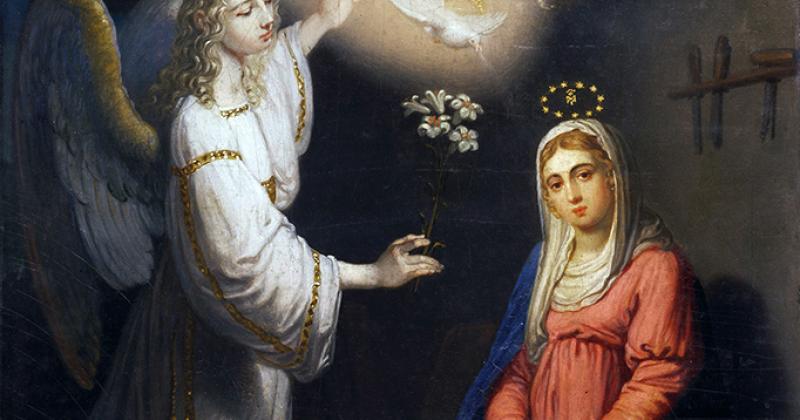When you get right down to it, reaching into the very bottom of the barrel of faith, what are you likely to find that in fact determines everything? I mean, is there some absolutely bedrock belief upon which the whole shooting match depends?
There surely is. And — surprise, surprise — it is not Christmas or Easter. In point of fact, in the absence of this single event, neither birth nor resurrection could possibly have happened. Nor would there be anything to celebrate.
Give up? It is the Lord’s Annunciation. A most favored feast, by the way, as it allows for the austerities of Lent to be lifted for a day. And, of course, because it is the catalyzing moment, setting everything on which our salvation depends, happily in motion. The sheer unforeseen, unscheduled enfleshment of God; who, ever so quietly, and without warning, enters the material and human world. First as a zygote, then as an embryo, to be followed finally by a fetus, which is Latin for little one.
The Incarnation of God. It doesn’t get any more amazing that that. And there can scarcely be a greater injustice in the world God chose to visit, pitching his tent in the midst of a totally suspect humanity, than the fact that he would come unto his own people, and that they should refuse to accept him. What could be worse? It was the perfect marriage of God and man, heaven and history. Who would want to untie that knot?
“The absolutely staggering alliance of Logos and Sarx,” is how one of my heroes put it in a wonderful book on which, 40 some years ago, I first cut my theological teeth. A shy little priest from Bavaria, whose Introduction to Christianity so captivated a sitting pope that he, Pope St. Paul VI, made him a bishop on the strength of it. The rest, as they say, is history. And there are those who tell us ideas have no consequences.
How the great poets have loved to rhapsodize about it. Gerard Manley Hopkins, for instance, whose portrait of our Blessed Lady — “Who gave God’s infinity / Dwindled to infancy / Welcome in womb and breast, / Birth, milk and all the rest” — says it all. Or that Elizabethan spellbinder, John Donne, describing Christ’s entry into the world as sheer “Immensity, cloistered in thy dear womb.” And, then, finally, there is this anonymous poem from the 15th century, set down in a series of stunning paradoxes:
A God and yet a man?
A maid and yet a mother?
Wit wonders that wit can
Conceive this or the other.
A God, and can he die?
A dead man, can he live
What wit can well reply?
What reason reason give?
God, truth itself, does teach it;
Man’s wit sinks too far under
By reason’s power to reach it.
Believe and leave to wonder.
It is on this day the wonder of Incarnation that we most fittingly feast upon. And if theology is what happens when faith enters the classroom, then this is what faith is required to understand. God himself falling headlong into the cosmos in order to exist as a man in a world of other men. So, where does it all begin? In a little room in Nazareth, where an angel and a young girl meet to decide the fate of the universe. Shall God make a new beginning for a bent world by actually becoming one of us? It all depends. On the willingness, certainly, of one extraordinary woman (“our tainted nature’s solitary boast,” declared the poet Wordsworth), who will say Yes to God, making room for his divine Son in her womb, whom she had already conceived in her heart.
Yes, something new has come this way,
flinging sadness far, far away.
God has done this, we mustn’t fear.
Rejoice, indeed, for He is here.
